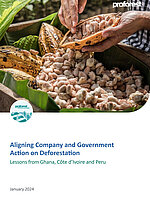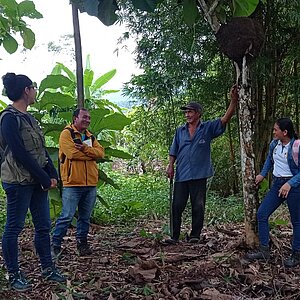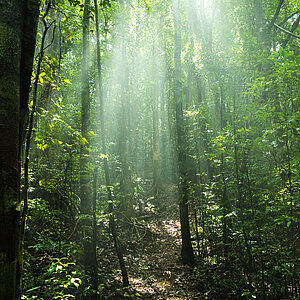Deforestation-free supply chains for climate mitigation

With the support of the IKI, approaches for non-deforestation supply chains are being linked with national climate mitigation initiatives in Peru.
The organisation Proforest has been expanding its "Production Landscape Programmes" into new areas of policy, new commodities and new regions. With support of the International Climate Initiative (IKI) the organisation has been able to start work in Peru.
The organisation will look at how they can share lessons from their Africa programmes with Peru, to link the no-deforestation commitments of international companies to Peru’s initiatives to fulfil its National Determined Contributions (NDCs) under REDD+, whilst ensuring smallholder inclusion and sustainable local livelihoods for peoples and communities in the production landscapes.
Peruvian ambition under REDD+
Peru has put in place ambitious targets under its REDD+ programmes and has developed commodity-specific programmes to develop sustainable goods for international markets, such as palm oil and cocoa. Using Proforest’s experience of working with large downstream commodity-buying companies, the IKI project will support the Ministry of Environment’s plans to engage with the private sector, and to provide guidance and support smallholder sustainability particularly for the palm and cocoa sectors. This work falls under one of five key pillars of Peru’s NDCs focused on agriculture-driven deforestation.
The National Oil Palm Strategy and NDC implementation work
The project work in Peru has started with supporting the Ministry in the development of the National Oil Palm Strategy. A first draft is currently being reviewed internally and will be submitted to the government by the end of 2021. Following this, the project will support the government in implementation, taking into account its support to the implementation of the NDCs.
The project is supporting the government’s submission to the UNFCCC, which will contribute to establishing the national reference value by mapping forest emissions across the different Peruvian regions and advise on which actions in each region could contribute to reducing deforestation and forest degradation. This work is expected to be completed by the end of 2021.
Capacity building at government level, but also for smallholders
In this context, capacity-building trainings for national government staff and trainings for small-scale producers on RSPO compliance are also provided, focusing on the environmental and social standards required for certification by the Roundtable on Sustainable Palm Oil (RSPO).
The project is working with the private sector to map RSPO coverage in the landscape so that these trainings for smallholders can take place where they are most needed. This will ensure continuity and local ownership of the implementation of the NDCs at government level. In addition, smallholders will receive critical support to achieve the RSPO standards so that they can access international markets.
The training materials are currently being developed in cooperation with the Tropical Forest Alliance and are expected to be handed over to 30 small producer representatives from various smallholder associations in October 2021. These representatives will then act as multipliers to pass on the knowledge and materials to the members of their associations.
South-South learning exchanges between landscape programmes in Peru, Ghana and Cote d’Ivoire
Initial ideas for engagement in Peru's Alto Huallaga landscape are currently being developed with various partners. Through this branch of Proforest's Production Landscapes Programme, work in Peru will be linked to ongoing work in Côte d'Ivoire and Ghana on production landscapes.
In this way, experiences and best practices can be shared while creating a deeper understanding of the political, social and environmental landscape in Peru. This will take the form of a South-South learning exchange, which will take place online for the first time in 2021 due to travel restrictions.
Background information: The Peruvian social and environmental context
Peru holds the second largest area of Amazonian tropical forest in the world, and with over half the country forested, more than 330,000 people depend directly on the forest for their livelihoods, as well as the products and ecosystem services that the forest provides. From 2002 to 2020, Peru lost 2.64 M ha of humid primary forest.
In the Peruvian Amazon, the main drivers of deforestation are small-scale agriculture, commercial mining and related road construction; whilst forest degradation is caused primarily by illegal logging.
Around 80 per cent of Peru’s more than 31 million inhabitants self-identify as either indigenous or mestizo (mixed) (see Minority Rights). There are 51 indigenous peoples in Peru, including Achuar, Aguaruna, Asháninka, Shipibo, Huambisa, Quechua and Aymara, who together comprise 45 per cent of the population.
The link has been copied to the clipboard
Contact
IKI Office
Zukunft – Umwelt – Gesellschaft (ZUG) gGmbH
Stresemannstraße 69-71
10963 Berlin
Further information
Here you can find more information about Proforest's work in the field of production landscapes.












